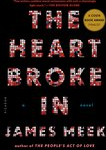 Two organisms living together. Sometimes, when each organism gets something from the other, we call it symbiosis. Other times, one feeds or uses the other while giving nothing in return. Then we call it parasitism. Sometimes what we think are parasites can carry protective benefits as well. There are theories, for example, that our digestive systems developed in symbiosis with what we are now calling “good” bacteria. The complexities involved when two organisms cohabit make it a good metaphor for human life. We marry, for example, but when we love, we are vulnerable.
Two organisms living together. Sometimes, when each organism gets something from the other, we call it symbiosis. Other times, one feeds or uses the other while giving nothing in return. Then we call it parasitism. Sometimes what we think are parasites can carry protective benefits as well. There are theories, for example, that our digestive systems developed in symbiosis with what we are now calling “good” bacteria. The complexities involved when two organisms cohabit make it a good metaphor for human life. We marry, for example, but when we love, we are vulnerable.
James Meek’s sprawling and moving new novel “The Heart Broke In,” set in London, is full of dyads connected by bonds of love, friendship, family, and, yes, hate. Ritchie, a rock star, is married to Karin, but dallying with an underage girl. Ritchie’s sister Bec, a biologist, appears to be married to her work: researching whether a particular parasite, which can cause blindness, also confers some immunity to malaria. She is engaged to Val Oatman, editor of a tabloid paper, until she realizes that she doesn’t love him. His love changes to hate after she breaks things off. It’s Val’s complex revenge – he threatens to reveal secrets – that drives the story.
The bonds Meek describes are not just those of family, but of friendship and country. Ritchie’s and Bec’s father was a soldier, killed in Northern Ireland many years before the start of the novel. Their mother has gone to live in Spain, though she travels back to see her children and grandchildren. When Ritchie decides to make a film showing his meeting and putative forgiving of the murderer – or is he a freedom fighter? – now released from prison, he seeks permission from his mother and sister. The new relationship between Ritchie and his father’s killer is as interesting as all the others, and adds a new dimension to the story.
There’s also a delightful naïf, Alex, Ritchie’s old friend and former band mate who has become a biologist. Alex’s long bouts of concentration are described vividly in terms the reader can connect with: he can visualize cells and the proteins folded within them (though he usually expresses himself with an advertising jingle). Alex becomes obsessed with fathering a child, allowing Meek to explore both the biology and the sexuality (or not, in the case of IVF) of human reproduction. Alex is more successful as a biologist. When celebrity accidentally comes his way he tumbles into it, then stumbles out again.
Celebrity, betrayal, vengeance, Northern Ireland, biology, African poverty, American prosperity and general ignorance, and rock and roll. Meek uses his broad canvas in this entertaining and lively book to make some interesting observations about human nature. What’s your favorite story of a good act by a bad person? Let us know in the comments.
Have a book you want me to know about? Email me at asbowie@gmail.com. I also blog about metrics at asbowie.blogspot.com.


